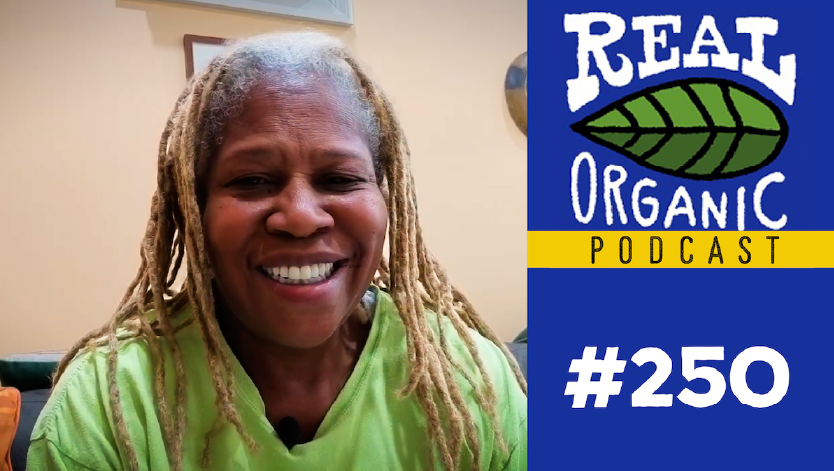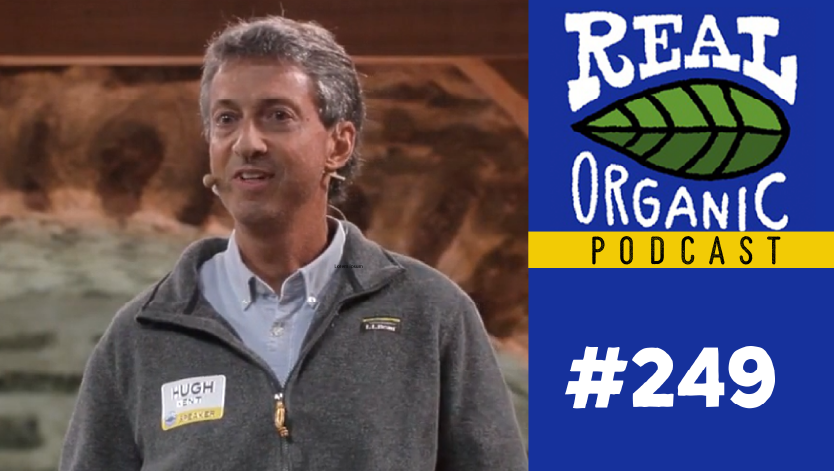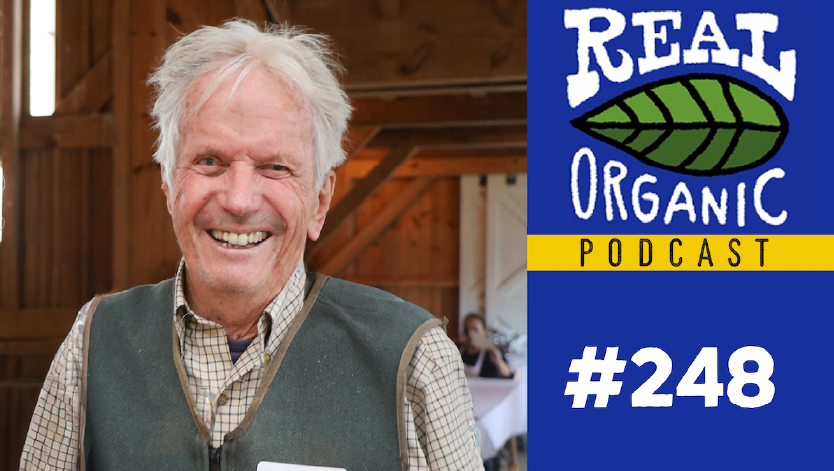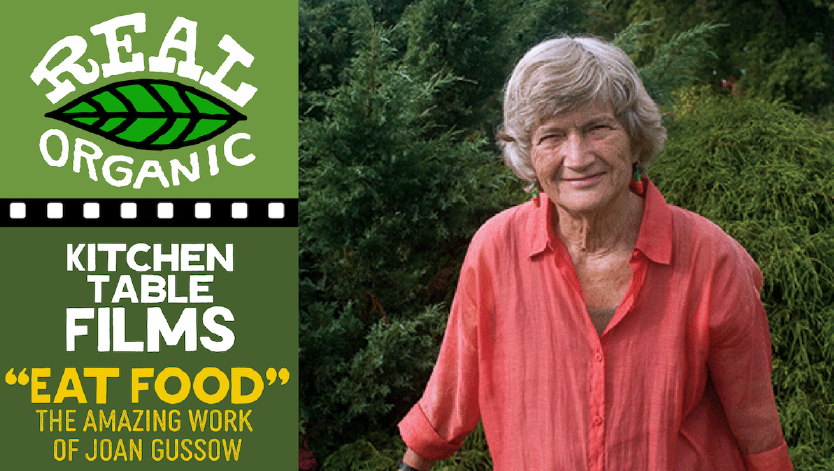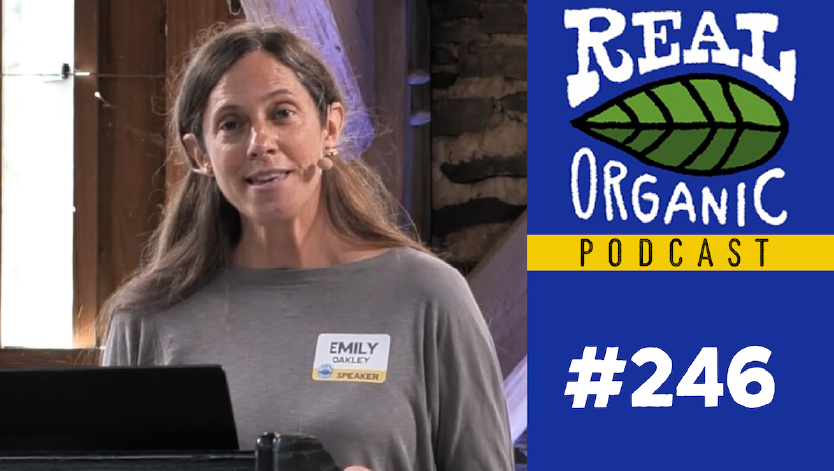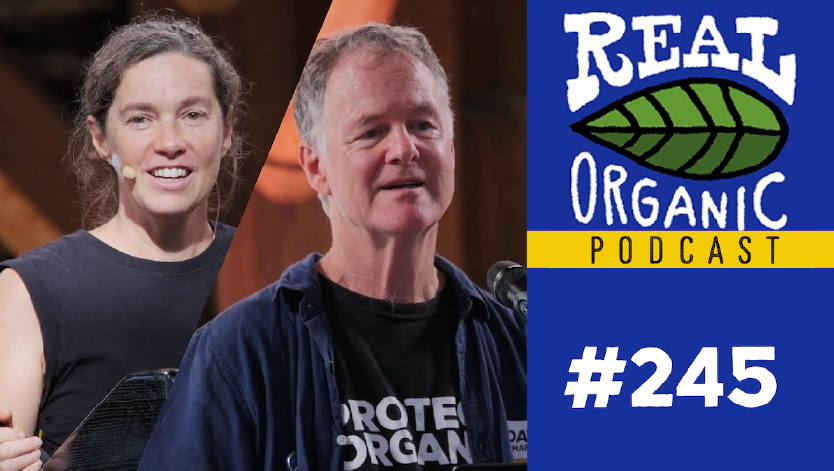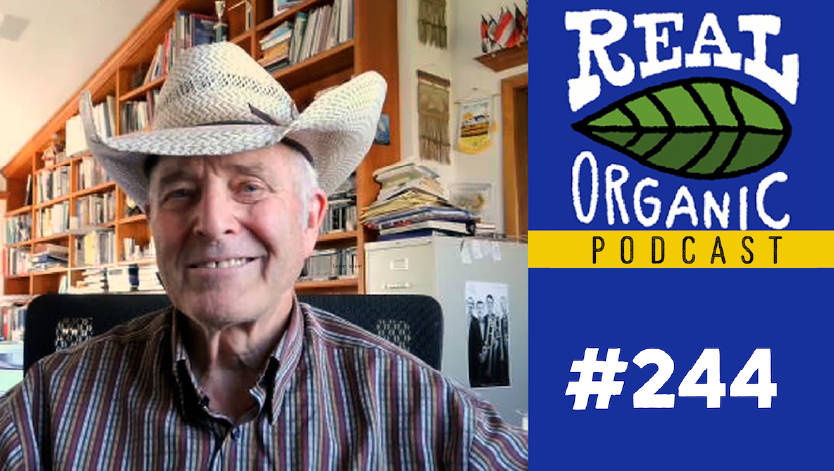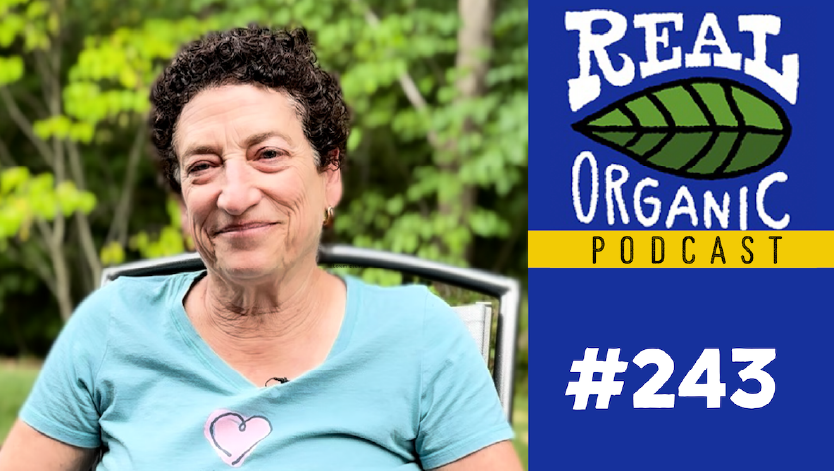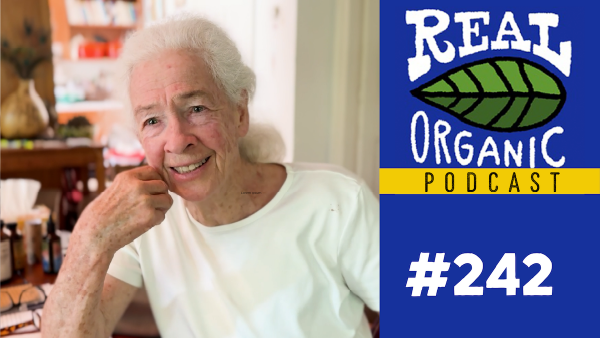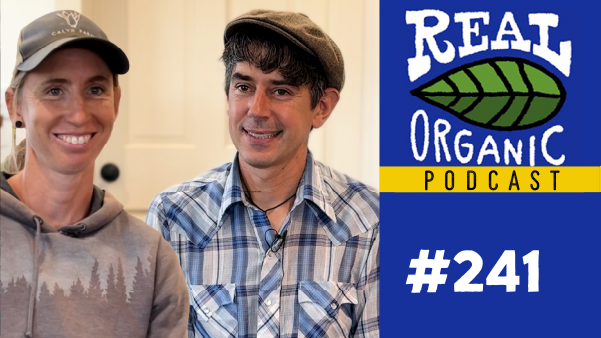Episode #201
Frances Moore-Lappé: Power, Democracy, and Food
Welcome! You can subscribe and download episodes of our show through your favorite podcast app.
You can also subscribe to receive the video version of each episode on our YouTube channel.
Our Frances Moore-Lappé interview has been edited and condensed for clarity:
Dave Chapman interviews Frances Moore-Lappé at the Small Planet Institute in Cambridge, MA, August 2024:
Dave Chapman 0:00
Welcome to The Real organic Podcast. I’m talking to the Francis Moore Lappé today. Frankie, thank you for welcoming me to the Small Planet Institute here. I wanted to start by looking back. It’s been, I think we figured 53, years since diet for a small planet came out, a book that sold 3 million over 3 million copies and and I believe, had a pretty big impact in our culture, in ways that most people who have never heard of the book are affected by it, but they don’t know it. And, yeah, it is cool. So I want to go back for a minute to the creation of that book, which was a big book about food and our culture, our civilization and how they affect each other. And then we’ll get to democracy and how that affects everything. So let’s go back to 1971 the year the book came out. Well, you were how old
Frances Moore Lappé 1:07
I was. I don’t know I was in my
Dave Chapman 1:09
26 maybe. Yeah. So, yeah, seven, yeah. Young person.
Frances Moore Lappé 1:14
I was not only young, but I was never imagined myself as a writer, because I love to tell students that I made a C on my first English paper in college, right? Yeah, so I never thought of myself as a writer, but if you got a message, you got to share, you learn, right? And at the time, during that, right before I began my quest that this book exploded, called The Population Bomb by Paul Ehrlich at Stanford, who was telling us that we’d run out of food and that we were, you know, on the edge of mass famine because of scarcity. And I said, Oh, that’s a big question. If I could dig into that one, maybe I’d find my path. And so I, I said, Okay, I’m gonna figure that out. And I was so fortunate, David, I had my my husband was a postdoc at Berkeley, so I had access to the library in Berkeley library, and so I could just go there and go through the stacks. You know, that was all before with my dad’s slide rule. You know, that was before calculators neural before the internet, and I just put the numbers together and realized, wait, no, no, no, there’s more than enough food. So what’s the problem? And that’s when I realized that we create the world according to the ideas that these mental filters, and if we think of scarcity as our problem, then we actually we ended up creating the experience of scarcity because we didn’t go deep enough to realize that what was scarce was democracy. Was people’s power to access what we could grow with the land they need to grow food. So that was the just this incredible gift that I was able as a young person to dig deeply and to have that aha moment, and then to write this one page handout that became the book because of one person who I got to thank a few years ago, before she passed with Betty Ballantine, she was the founder of paperback publishing in America, and I somehow, through a friend, got a one page version of my thesis to her, and she came out to my house and convinced me to do it into a book. And the last thing she said to me, Betty said to me was, Well, whoever publishes it, I will buy it. So that was, I was just a kid, and I just the good fortune, you know, you never know what will open for you if you just put one foot in front of the other, right? And I had this good fortune to have the door open to get this book published at a time when just beginning of people questioning other aspects of food, like pesticides and food and processed food. And so diet came diet, personal planet came out just at this moment where it could really just take off. And
Dave Chapman 4:22
I think people were starting to question just about everything at that time. It was just the tail end of Vietnam. We were rolling into the 70s, but just huge societal changes. I mean, you know, we were very divided in our country politically at that point, it was somewhat reminiscent of now and generationally too,
Frances Moore Lappé 4:47
yeah. And it was beginning of a woman’s movement too. So the female voice, I think, was more able to be heard, because it was the beginning of that awareness of how women had been so silenced. And
Dave Chapman 5:00
and big changes in race in America. Yeah, so many movements were clamoring for a change, yes. So tell me about you. You decided to focus on on food. I’m sure you didn’t think this is going to be a big book, but this is what you chose to work on, because
Frances Moore Lappé 5:18
it’s so basic, so basic. And because that book, Population Bomb, was saying that the problem was scarcity, a lot of people were focused on hunger, and Paul Ehrlich’s book said, Oh, well, we just need to grow more food. And so it was just a good intuition. I had no idea what the numbers would tell me, but just that, if I could figure that out. What is the real cause of hunger that I could find my path. And fortunately, you know, this librarian I never got to, thank helped me go stack to stack, to put the numbers together. Literally, I had to do all the calculations, you know, and realize that, no, there was more than enough, and that then the next question, the next question. But I just love this idea too, that by making our in the empowerment that we can choose, you know, by choosing a plant based diet, we had so much lower footprint on planetary resources, and that was just so empowering to me, that those daily choices that we make connect us with each other, the availability of food, the quality of our soils and our water, all of that that I just guilt chest as I say that you know that we eat multiple times a day, and every time we do, we’re connected to it all and making even it’s a tiny, tiny feedback. We’re sending out messages to the marketplace and to the farmers of the world, et cetera, about what is in demand. So we each have a little bit of power there, right? Not to mention our power as citizens to change policy, to support what’s healthy, but both and right. It’s our role as citizen, but also our role as buyer. You know of
Dave Chapman 7:12
Yeah, eater, yes, activist eaters. I believe that without activist eaters. There cannot be activist farmers. Yeah, this has to be a coalition
Frances Moore Lappé 7:25
and always. You know, the think great thing about being an activist Eater is you do it multiple times a day. So voting, we do, you know, once a year or so, but just something that reminds me every single day you know, of the choices that are best for all. So
Dave Chapman 7:43
could, could you, and of course, you wrote a whole book. Somebody asked Paul Hawken once, well, could you just sum up the book? And he said, No, if I could, I wouldn’t have made it to write a book. But well, could you give it’s really easy. Yeah, go ahead, tell us. Well, it’s just
Frances Moore Lappé 7:59
that a grain fed meat centered diet, you know, requires per calorie consumed just enormous amounts of land and fossil fuel energy now, and a grain of a plant centered diet is just a tiny fraction of that impact. And so it just like, what? Why are we doing this? And then I realized how much healthier a plant centered diet is that a meat now, in 2015 very few people know this, and it’s amazing to me that it’s not known 2015 the World Health Organization declared red meat of, excuse me, declared processed meat of carcinogen and red meat of probable carcinogen, and yet we still feed our kids, you know, Bologna and hot dogs. And so there’s just so little, still little awareness of the dangers, well, the over the incredible use of our ecological resources, but then also the hazards if a meat centered diet compared to a plant center diet. So it’s just like, Oh, I just had to tell the world. And so I, you know, I didn’t, never imagined to be a writer. I just wanted to share this, and so I, I first created a one page handout, I think, and it got into the hands of the founder of paperback publishing, and that was the beginning.
Dave Chapman 9:38
So Mark Bittman said to you, you arguably wrote the most important book about food ever. That’s, I know that’s pretty powerful.
Frances Moore Lappé 9:49
I’m so happy to be reminded of that I haven’t forgotten that. I’m like, Oh,
Dave Chapman 9:53
you two had a wonderful conversation. It was a virtual conversation at the at the New York y i. Yeah, and I want to ask you that I I interviewed, I told you I interviewed Michael Pollan, a couple blocks from here, couple times, actually, and he wrote omnivore dilemma. And I asked him, it was the 15th anniversary of Omnivore’s Dilemma when, when I interviewed him, and I said, Michael, since omnivore came out, do you think that is the food system gotten better or worse? Because I’m actually very confused about it. And he had a really interesting answer. He said, Well, I think the conversation and the public dialog and the understanding has all gotten much better, and the food system has gotten worse. Yeah. And I thought, with that, that’s exactly right, yeah, yeah. And it was, that’s why I was so confused, because there, there people have so much more sophisticated understanding, yes. And yet, the actual food system, and there’s, there’s a, you know, the the Rebel Alliance is out there with their CSAs and and direct to sale, you know, but, but the, but the food system that feeds most Americans, I think, has continued to to get worse and worse. So my question for you is, in the 53 years since diet for a small planet came out. I know it’s not like you’ve just been sleeping for the last 53 years. You wrote 19 other books, and we’ll talk about democracy, but I’m just curious, what do you think has has the system that you described gotten better or worse?
Frances Moore Lappé 11:36
In general, it has gotten worse, because we can get more into this, but we live with the mythology of a free market. We do not have we have a market that is driven by highest return to existing wealth. So wealth has continued to concentrate and corporate control has continued to consolidate over our food system. And where are the biggest profits? They are in Ultra processed foods. So now something on the order of, like, 60% of our calories are coming from foods that have very little health benefit and some real negatives, so And but, and it’s connected that people have less time, because, again, a concentrated power people are inequality has become among the most worst in the world, the level of poverty, whether it’s literal poverty measure, but people feeling strapped in this country. And so what do you do? Well, can you go and afford to buy fresh foods. Do you have the time? Well, I’ll just grab this. I’ll grab that. I totally understand it and and not realizing that maybe, actually, if you add it up, I haven’t done that much research on it. But if, when you think about what you’re paying for this ultra processed foods. Is it really cheaper? I don’t know, but certainly is in the packaged form, where you can get it quickly and what the single package is inexpensive, right? So I think all of that has gotten so much more extreme, and as corporate control has gotten tighter, which comes back to what is democracy, and how does a democracy prevent the the control by so few and over such basics our life? So that’s how I understand it. And yet, at the same time, as you say, you know that there, there there is more awareness, there are food cooperatives, and there, you know, organic labels now, and there is more awareness, but nonetheless, the intake of very unhealthy food is extreme, yeah. And also being pushed into the global South, where, you know, people can least afford to, you know, where, again, you know, it’s like, I think I’d have to factor in that no one is, but I think, if not the most, it’s one of the most heavily consumer, heavy consumers of Cokes, is in Mexico, and it’s what you can grab, and it gives you that, that quick sugar high. And if you don’t have much money, and you can get that, I can understand it, you know, but it’s really, really, terribly destructive. And, yeah, it’s killing us. Yeah,
Dave Chapman 14:50
yeah, thank you. It is very confusing to see what I would consider to be a bad food. So. Them spreading. And of course, the Green Revolution was consciously trying to spread it to Mexico. And you know what? I’m not even going to judge the motives of the people who spread it. I’ll say great. Maybe your motives were great, and you wanted to have people see people have a higher standard of living, maybe. But what’s the outcome? What are the impacts of spreading Iowa to Mexico and then India, now to Africa? Yeah, right. I know. I know you know Tim Wise. And I yeah, I know you named his book eating. He told me that. So, which was a great title, by the way, he had a wonderful story about that.
Frances Moore Lappé 15:46
Yeah, I remember that conversation. Actually. I can visualize Tim and me on my back porch,
Dave Chapman 15:50
yeah. And then he said he was, you had lunch together, and he was, he was riding home on his bike, and his phone rang, and he stopped. It was you, and he said, Yeah, Frankie, hi. And you said, Tim, what about eating tomorrow? And he thought, you’re inviting him to lunch again.
Frances Moore Lappé 16:04
He said, we just had lunch.
Dave Chapman 16:08
You know the title? It was great. It’s great title. So, you know that is, that is what we’re talking about, eating tomorrow will, will the choices that we make today, whether they’re conscious or not make it that people don’t get to eat tomorrow.
Frances Moore Lappé 16:25
Well, I think there’s certainly more ill health coming up ahead as we move into Ultra processed foods and absolutely and as we move away from really encouraging in terms of poverty, encouraging people who to have access to land, to grow food, to feed themselves. And that’s why, you know, in my recent books, I’ve talked about organizations like the one in Brazil, the landless workers movement. My favorite story about the Deccan Development Society and India of very, very poor. You know, in India, women typically have no voice. Yet these women came together, put their little little coins together at night, and ended up each one getting a little bit of land, a little bit of land, and they created 21 crops. They walked me out of their fields, in one field with 21 different crops, and they said, there’s now no hunger in our village. And, oh, I like to finish that story by saying, as I was walking out of the village, I thought I’d finish the interview, the women came rushing after me, and I heard this. I turned around and they said, we forgot to tell you the most important thing, and I stopped the most important thing. We found our courage, and that’s really the theme. I get chills when I say that, because that’s really the theme for each of us, the courage to do what we thought we could not do. You know, courage is rooted in the word cur, which means heart in French, and it’s to do what we thought we could not do. And maybe it’s bring up a difficult conversation in your family or in your classroom or with your friends and say, Oh, well, why don’t we do this differently? Why don’t we try something new? Why don’t Did you know that actually eating in the plant world was much better for every you know, just those simple things. And did you know how important it is to vote tomorrow? But it’s, it’s, I love that idea of of courage really being defined as simply doing what makes our heart beat, what we what scares us, that something new. And that’s really what I hope. That theme of all of my work is of just trusting that we never know who’s live, who’s going to hear, who’s going to see, and think, Oh, if I could, if she could do that, maybe I could try that. And, and so never think also, I just want to underscore, you know, never think that. Well, I don’t have a voice like this person does, who’s being interviewed. Everybody has a voice. Somebody is watching whoever you know is listening to us, watching us. Now they influence others, and you all have power therefore, yeah,
Dave Chapman 19:22
and we really don’t know where that goes. That’s right. As I said, we throw that rock in the pond, yeah. And the ripples, we don’t see where they where they end.
Frances Moore Lappé 19:33
Well, one of our posters around here has my, one of my favorite things, it’s not possible to know what’s possible. So we might as well go for the world we want, because we don’t know, like, just like you’re saying, we don’t know who, who might be paying attention. And so that’s really the key to me. Could you say that again? Just that it’s not possible to know what. Possible? Yeah, so let’s go for the orwood one.
Dave Chapman 20:03
I work with wonderful people, but many of them are afraid, and they they they always want to find some compromise whereby they feel like they end up with a seat at the tables the way they put it, Oh,
Frances Moore Lappé 20:21
that’s interesting, that they’ll lose their seat at the table if they say it’s
Dave Chapman 20:25
better to be at the table with Godzilla and have a little bit of influence, you know? And indeed, they can use it when they go back to their people or their funders and go, Well, we’re part of the conversation. And I go, you’re not really part of the conversation. You’re becoming part of the echo chamber. You know the world needs to hear your voice, what you really believe, not just what they might be willing to hear, what they being the side that you really disagree with. You know that we need, we need to speak our truth, otherwise who will?
Frances Moore Lappé 21:00
Yeah, yeah. And, of course, I was terrified, terrified, you know, oh, what if I got a decimal point wrong, and the whole thing is and, but I did it, and then I just had this great good fortune of meeting Betty Valentine, yeah. Did I tell you that I got to see her before she passed, and I said, Betty, why did you take a she founded paper about publishing in America. Why did you take a chance on me? I never published anything. And she said, it was your idea. She said, If you couldn’t write it, I could do that, not today, but a publisher, tell a writer, oh, I’ll write the book.
Dave Chapman 21:44
Do you think that back then? This is 1971 I graduated from high school that year. It was, I remember it. It was a very wild time in in America. It was a time when I think books had more impact than they have now, as we’ve moved to the Internet age, and I think a best seller now wouldn’t have made the the top 20 list back then. You know, it’s changed. And there’s, there’s, it’s not necessarily that there are fewer books. There might. They’re probably a lot more books, but they have much smaller audiences. There are fewer gatekeepers, yeah. So if you don’t get chosen by the Book of the Month Club, yeah, and, and people self publish books, and maybe only your mama reads it, yeah, but it’s another book out there. So I’m curious, do you think any book could have the kind of impact that Silent Spring or diet for a small planet had,
Frances Moore Lappé 22:41
trying to think of what recently has I, I think of I’ll just not quite answer the question, but for me, we’re working on a book that we’re really excited about now, and if nothing more, even if it doesn’t sell A great number, it is, for me, a credibility, credibility basis that I can then through other media, as you say, you know, have a voice, that even if your people, because there was a book, because there was a book, yeah, yeah, that’s right. And also it forces me to do a lot of the research and and because I’m, I’m just excited to learn it in any case, and I can do other short pieces based on it. So it’s not just the book, but certainly the book is a credibility document. Yeah,
Dave Chapman 23:30
no, that’s, that’s helpful to me, actually, as I contemplate writing a book and going, well, Will anybody read it? You know, it’s, it’s, it’s confusing, because there’s so much out there, both books, written, blogs, letters, podcasts. Yeah, that that it’s easy to become discouraged. I mean, I know that 1000s of people will watch this and and that’s great, but I also know that, do you know who Ayanna Elizabeth Johnson is. She’s a black ocean ocean biologist, and she works a lot with climate change in the ocean, and in the relationship there, she’s pretty wonderful. And I saw her being interviewed, and she said that somebody in the audience said to her, you should be the next Jacques Cousteau, right? We need, we need you to be the next Jacques Cousteau. And she smiled and said, Thank you, but I can’t, and nobody can. And she said, You know, I know Jacques cousteau’s, I think it was grandson and and he said, There will never be another Jacques Cousteau, because Jacques Cousteau was on TV and a third of America watched his Yeah, and a third of America doesn’t watch anything anymore. Yeah. Everything is is different.
Frances Moore Lappé 24:53
Yeah. The other thing I want to say here, because a lot of people don’t realize this, is that one can self publish. And actually one of the books I’m most proud of, and that has sold the most, one of my better sellers. We published. It was distributed through Chelsea green, the small distributor, but we did all the publishing, the design, and I was just thrilled yesterday, of the day before, when my favorite podcast, NEWS REPORTER, person, Tom Hartman, do you know that name? Anyway? He’s super anyway, he read from getting a grip, you know? Yeah. And so you never just self published books, you know? They could get into the right hands and and give you give one a voice. So I haven’t ever regretted having gone that pathway for that book.
Dave Chapman 25:48
So let me ask you, I know that after diet for a small planet that you were standing on a different platform than before you wrote it, and you looked around and it’s you’ve you’ve written 19 books since then, just to say so you went in a particular direction. I think you went very strongly in the direction of pro democracy. Does that sound right to you? Yeah. So tell me about that process of you could have just kept writing about food, and that would have been wonderful. And what was the process whereby you said, this is what I need to write about now?
Frances Moore Lappé 26:29
Well, I felt like it was really scary, but I felt like I felt a bit of fraud if I said, Okay, folks beneath hunger and the degradation of food. Beneath that is democracy. But if let’s go there, if I didn’t go there, then how can I be preaching that? So I then joined forces with a person who was a good organizer, and we founded a center in democracy called the Center for Living democracy, and that’s continued to be my sort of meme, the living democracy. It’s not just about elections, it’s about how we live together. And yes, voting is part of it, for sure, but it’s also engagement and being consciously aware that the consumer choices we’re making are affecting the whole and so this nice democracy is a way of life, not simply a way of doing elections right. And so that was our center in Vermont, and I one of the things I’m most pleased about that I’ve done is we created a national news service focused on solutions news, because that was the concern I had, that our news was all about all the broken things, all the things that are wrong and crime and boom. And I know that we humans, we model ourselves after one another. And I wanted people to be like, Oh, I could do that, you know, if they were reading a story of solutions. And so we created the American news service, and that over a decade, during a decade, we got into about half the biggest papers in the country with solutions news. And it was just incredibly rewarding that period of my life ended for quite a number of different reasons, but I was just that was one of the things I’m most proud of in my life, that we were able to make that work and and have that kind of reach. And you know, some of them were just really feel good stories. I remember this one about in Chicago, about this, this line where the story about a number that kids could call if they came home to an empty house and were lonely, and they could call this number, and they called it Grandma, please. And, you know, so it was, it was kind of those feel good stories, you know, all the way to campaign finance reform and crime prevention, all all but focused on what we can do, what we citizens can do.
Dave Chapman 29:10
Yeah, that’s great. You know, we constantly struggle with that in the real, organic project. And I think there are a lot of similarities here, which is that we are not just trying to build a brand that is a better brand than the USDA organic brand. We are trying to reignite the organic movement. Yeah, and have people become actively involved in the food system and what they eat and how it’s grown and how it’s distributed and how it’s sold. And it’s a, it’s a, it’s an ambitious project, yes, and it is a project, right? It’s not, it’s not a one off thing. And one of the things that we confront is if we tell what’s wrong too much, you know, people, yeah, collapse. And, you know, I read, I. Your book, what was the book during democracy? And, you know, some of it’s hard, yeah, it’s hard to read about the ways in which democracy is so threatened and and then you also have the solutions, or ways in which we can actually do something. So I think there’s a balance there. We can’t just give the solutions, because there are real problems and people don’t actually know about them. Mostly,
Frances Moore Lappé 30:27
no, it’s shock and inspiration is what I try to I try to always include both. Because I think even though then the shock part, even though a lot of my audiences would have a general idea of the problem, they don’t know the extent of the problem, the degree of the problem. I mean, just take inequality as I was saying that I don’t think most Americans realize that we are more we have greater income inequality here than in over 100 countries, and still, most Americans think we’re kind of a middle class country. But no, no, no, we have extreme inequity here. And so I try to shock and then inspire by both in our own history of in what’s happening now, but also what other countries are doing to to solve these problems. So it’s, it’s a both and for me, yeah, definitely,
Dave Chapman 31:26
yeah. Do you find by looking at other countries, you’re finding what look like realistic solutions or paths towards solutions? For us?
Frances Moore Lappé 31:39
Well, the thing about being one of the worst is that there’s a lot of inspiration out there. So, yeah, I want to do more of that. I mean, I haven’t been traveling much recently, but, you know, I have my daughter and I one of the smartest things I ever did was to write a book with my daughter, Anna LEpe, and we wrote a book, Hope’s edge together. In that Hope’s edge, the title, her title, was to interview people who are pushing forward the edge of hope for the rest of us. And so, you know, we got to go visit with the landless workers movement in Brazil that were where they have a tiny percent of the population that controls most of the land, and they were risking their lives. In fact, some of them killed because they were saying, Look, all this unleashed unused land, we’re going to be we’re just going to take it over and grow healthy crops and and then get because there was a law of saying that unused land that you had to use, the law, some kind of national law that said that farmland had to be put to a social use. So they had something behind them, you know. And then they they would just settle and start growing healthy food, and became this incredible, beautiful national movement, and it was all organic, all of their production, and they’ve, now, you know, continued to grow, and that was just so inspiring. So Anna and I traveled the world, and we, you know, went to visit them, and the I could go on other examples. No,
Dave Chapman 33:19
that’s great. But I have a question. First was that, would they call themselves agroecological? I’m just curious. They’re part of the agroecology movement, absolutely right, which is a in as I understand it, a combination of deep organic and political activism, which I think organic began with, but it somehow got lost, yeah, you know, I think when we started, we, I know the people I started being organic farmer with, everybody was trying to change the world, yeah, and somewhere in there, I mean, I, you know, I had kids, I had a family, I had payments to make. I was trying to make a living as a farmer. And it, it becomes compelling. Yeah, right, yeah. And, and it is compelling for most farmers, I know they, they feel pretty overdrawn at the brain bank, so that it’s hard. But you look at these people who have nothing, yeah, and they’re saying, No, we need, we need to make a movement. We need. This is political, yeah, pretty amazing. Yeah, it was just so moving. Was it? Was it scary for you to go to places like this, where obviously you’re, you’re far from the Safe Streets of Cambridge, right? And, and did you feel vulnerable? Never,
Frances Moore Lappé 34:43
I don’t know, never, I don’t, yeah, we went into, wow, rural Kenya. No, I, I can’t ever India. I can’t ever remember feeling fear.
Dave Chapman 34:59
Sure, did you feel supported by the people that you were visiting?
Frances Moore Lappé 35:03
Always, always held. Oh, absolutely, yeah, but I was often traveling pretty much by myself, sometimes with my daughter, but yeah, I can’t remember. Maybe I’ve blocked it out, but I don’t think of myself a particularly courageous person, but I never felt, I never felt courageous
Unknown Speaker 35:24
person.
Frances Moore Lappé 35:25
I never felt, I never felt fear, really. I just felt so moved by what I was learning. And you know that when I visited one garmentai She passed several years ago, but she founded the Greenbelt movement in Kenya, and, you know, she took the time to to, you know, to connect us. So we got to interview people in the villages, and to, Oh, speaking of fear, though, she introduced us to a local minister who came to her little guest house, and we got to interview him, and I’ll never forget his reframing of fear, because he Oh yeah, the President had threatened him like several times, saying, if you if you preach again, any criticism implied or otherwise, you know, of our government, you’re going to be arrested. And he just kept on, kept on with his messaging about empowerment and democracy. And I said, Reverend and Joya, how did you? How did Why didn’t fear stop you? And he, he said, he, he got up out of his chair, and he did this little thing. He said, when a lion sees its prey, it doesn’t just pounce, it recoils and guards his energy. He says, Fear is just pure energy. We can do with it. What we choose fear is pure energy, and that has stayed with me forever, that you can take fear energy and turn it into empowerment, to do what you thought you could not do, instead of pulling back right, you can find the energy to be, you know, because this travel that Anne and I did, you know, we had to go places we never been people we’d never imagined, but together, we found that that courage and it was life changing for both of us. And now my daughter Anna, is the head of the Global Alliance for the future of food. So this has really taken her to that leadership role.
Dave Chapman 37:38
So that continues the the link with food system, yeah, and democracy, yeah, absolutely. So there’s, there’s so much to go in either direction. But let’s talk a little bit more about democracy. I’ve come to very similar place on a much smaller scale, right? Which is that when I was trying to figure out why we were experiencing the problems, we were in a voluntary program protected by a pretty good law, with around organic and we were seeing tremendous corruption coming into it, and it was losing its integrity. It was losing its transparency, so that you couldn’t see what is happening. And I came to the conclusion that this was a failure of democracy, that our representatives were not serving us, they were not protecting us, and that the people who worked for them, the government bureaucrats, also were not serving as a protagonist. They were serving certain large monied interests. And I get it. I mean, I understand that they have power and that they can call a congressperson or the head of the USDA and talk to them anytime they want. So you went way beyond the food system to go, what is going wrong with democracy, and how do we how do we protect it? Is that correct? So tell me about your thoughts about how I think you’ve said what’s going wrong. What’s going wrong is this crazy concentration of power in the hands of a few. How do we protect against such a power?
Frances Moore Lappé 39:25
Well, I think it helps if we drop the notion that we’re the best democracy number one, because as long as we think we’re the best, then how discouraging is that? If we see the problems and we see we don’t have the America we want, but we’re the best democracy, then our hands are tied. So it actually, yes, it’s depressing, but it’s also empowering to realize that we rank about 59th last time I looked in terms of the quality of democracy by the organization Freedom House, founded by Eleanor. As well. And so that realization that there’s so many that are succeeding better at truly representing the people’s voice, that’s sort of the fun foundation of democracy is it’s what I call hidden hope. And we’re working on a book by that title that hidden in the bad news is the great news that we can learn and it’s possible to do much, much better, because others have been able to achieve that. So first of all, recognizing that ranking low does not mean give up. It means Oh, we can do much better. And then looking at why, it must certainly have to do with the way that we the role of money in our political system that is so powerful, and the way that we allow you know that we still don’t have a good system for controlling disinformation about our social reality, we don’t have a transparent and democratic way of protecting ourselves from disinformation. That’s why I wrote a report called The crisis of trust. How can democracies protect against dangerous lies? So think that’s another part of it that it continues, but the disinformation continues, the mythology and and so I think, and part of the underlying, underlying understanding of where we Are, that I hold is that maybe more than other cultures, we buy into this notion of human nature as being all you can count on is our being selfish and competitive and materialistic. In other words, if you boil that down, all we are selfish little shoppers. And if we, if we see ourselves that way, then it’s very hard to imagine how democracy is possible. And so our work here at this at small planet Institute, and my life’s work, is to explain to people that we also have this deep, deep human needs for for a sense of agency, for a sense of meaning in our lives and connection with others, power, meaning and connection. And those three needs are they can even override our physical needs sometimes, because people will go on hunger strikes for what they believe in, right, and give up a lot in material to meet these needs for power, meaning a connection. And so that’s the philosophy behind all of my life’s work, and why I believe that we can’t solve the climate crisis, the hunger crisis, you name it, without democracy that is helping people meet those needs, so that we can come together and solve problems together and not just have the biggest donor setting the agenda for the country. Yeah,
Dave Chapman 43:19
yeah. Okay, that’s wonderful. So what would your first step be in terms of, okay, that I agree with everything you said. So what is the next step?
Frances Moore Lappé 43:34
Well, I think a lot of our work here is, I think I just said this, but I’ll repeat that, that to let go of the mythology that is so disempowering, because as long as we think that we have these problems, but we’re the bashful, then what can we do? So I think the more we can share. Hey, you know what is, I was just looking it up that our voter turnout is below the leading, you know, the leading democracies, we can do much better in voter turnout. We can have automatic voter registration everywhere we could. We could make voting a holiday. You know, they’ve done that in a few other countries, a holiday. And I think what was in Costa Rica, where they it’s a holiday with it’s really celebratory, and people give each other rides to polls, and that’s so simple, right? If we really believed in we believed in ourselves, that that was core. So I think making our democracy easier for us to participate in helping and getting rid of the anti democratic elements in it, which is like gerrymandering should be just be wiped out, because that disproportionately, you know, we don’t have equal vote when we have that. And. Um, so I think what’s that called?
Dave Chapman 45:02
Where you you get to vote your first choice, and then you also list yourself, called
Frances Moore Lappé 45:11
ranked choice voting.
Dave Chapman 45:12
Yeah, ranked choice voting. Could
Frances Moore Lappé 45:14
you they’ve had, I’m not up to the latest of where that’s but I know in Maine, I believe they had ranked nurse fighting. So you can put your you can rank your choices and, oh, I’m a little fuzzy on how it works, but
Dave Chapman 45:37
there’s somebody you think exactly reflects how you right
Frances Moore Lappé 45:40
feel, but even though you don’t win, right? So it’s in the way of of really giving the out thank you, a way of giving visibility to people who might not be noticed, and yet not giving up your vote in so doing. So you could vote for a third party candidate who you think has a slim chance, but be heard right, right? Because that would be tallied too, but you would, you would still get to
Dave Chapman 46:08
but if that candidate like, let’s say Ralph Nader, right? So let’s say you believed in Ralph Nader, and you voted for Ralph Nader, but you know, Ralph Nader was not going to get elected president, but at least it gives people who believe in Him, a lot of people a chance to vote for that. But if they if, if they aren’t one of the top two candidates, then your vote goes to the second person you’ve listed, yeah, whoever that might be, yeah. So it gives you a chance to express an opinion, and thus dare to support what you might want. I think it’s great without giving up thank you the vote and allowing the vote to be split for somebody you know that really you don’t want to get elected?
Frances Moore Lappé 46:48
Yeah? No, I’m so glad you brought that up. Yeah, thank you.
Dave Chapman 46:52
It’s excellent. I think it’s, it’s practiced in other countries, some other countries, isn’t it? Yeah, I
Frances Moore Lappé 46:57
think so, yeah.
Dave Chapman 46:58
I need to learn more about that. Okay, there was something that was interesting to me. You know, there’s this story that’s told about feeding the world, and American agriculture says that we’re feeding the world and which we aren’t. We’re not necessarily feeding ourselves. We import so much food to this country in organic I think we import two thirds of the organic soy and half of the organic corn, really,
Frances Moore Lappé 47:30
I know. Oh, thank you for telling me that I had no idea we’re the
Dave Chapman 47:34
best in the world at growing this. We have the land and the climate. So to me, that means probably there’s a great deal of fraud in what’s being imported. And, you know, and that fraud lowers the price, so the farmers who are doing it right can’t survive, you know, right now, the US has 1% of our farmland is certified as organic. 7% of the food sold is certified as organic. What? How does that work? Yeah,
Frances Moore Lappé 48:03
really, I had no idea. I would look into that more. I’d love to write about that. Yeah,
Dave Chapman 48:07
no, it’s a big deal, and some of it is just that a lot of the high value crops, like berries and vegetables have been gone down to Mexico because of the cost of labor. And so they’re and they’re not hiring Mexicans mostly for the labor. They’re hiring migrants from Central America and further south who are more desperate, yeah, and so they’re hiring them for these very low paying jobs, $10 a day for a long day. And that means that those blueberries, organic or otherwise, are very inexpensive, and people go, isn’t this great? I can get blueberries every day of the year and they’re so inexpensive, but they aren’t. They’re on the backs of those people who picked them, who got paid slave wages, yeah, and it and they have all the same water disasters that we have, one of the ways that Mexico does the water thing is they desalinizing the ocean, but it creates tremendous toxic waste that they don’t know what to do with this sludge. So, you know, they’re, they’re real problems. And when they, when the agriculture goes to another country to bring back to the US, they’re paying somebody’s paying a price, somebody’s paying an environmental price, somebody’s a climate price, someone’s paying a worker welfare price. So there’s a lie to this thing that we’re feeding the world, and what we end up exporting, as much as food, is we export the technology of the pesticide companies and fertilizer companies. There’s another story that goes through this, which is that everyone deserves organic. That was the slogan of a group of hydroponic certified as organic growers. And what they were saying is, well, we should be allowed, even though we don’t qualify because we. Want to make the organic food cheaper. Again, it’s the same story. This was a multinational company running this campaign. How do we how do we protect ourselves there? I know you’re not God, and I know you know we’re all struggling to figure this out. But what are your thoughts?
Frances Moore Lappé 50:21
Well, I my always. I began with, find a friend, find two friends. Just, I think, our feeling of being alone, what can I do? You know, it’s so disempowering. And just talk to your friends. You know, who? Who do you know, who really cares about this? And then what are the local groups that are focused on this and make new friends and get it connected? Because I think our feeling of lonely, I’m just one person. I don’t count. That is a killer, you know? So I always that’s why I’m so happy to have this group that I work with here, and we work with many others, that I feel like I’m part of something bigger than myself. And so all of us are, if we can make those connections and feel that that we’re larger than ourselves. So I just, and I just think, pretty much everywhere in the US, there’s, you know, just, you know, in your at your local coffee shop, in your church or your So, you know, whatever. Just ask around, like, does anybody care about this? And are there any groups locally, and can I go to that meeting? And, you know, just don’t try to just think that you’re alone because you’re not, you know, I think that’s the key. And who knows, you might make a new best friend.
Dave Chapman 51:48
That’s right, that’s right. Yeah, you talked about being on that march from Philadelphia to Washington, yeah,
Frances Moore Lappé 51:55
yeah, yeah. That was life changing. Yeah,
Dave Chapman 51:58
it’s a long way to walk. Yeah,
Frances Moore Lappé 52:01
I didn’t, it was like, often I didn’t think I could walk 10 miles, but I walked over 100 miles, and that, that was, you know, how I got to know Adam icon, who then he and I wrote together and so, but just to meet people from all walks of life, teenager from California, professor from MIT, you know, just the whole range of people all caring enough about democracy to walk and sleep on church floors at night and just walk and talk. And it was it. So I think being I haven’t heard of anything like that recently, but any opportunity that you hear about where you can actually get together with others and maybe do something like that that you thought you couldn’t do, or raise your hands and speak out when you know one of my little I don’t know, Whatever I say that first step is courage. Courage comes from the French heart, word for heart. But when your heart beats faster, convert that into that your inner applause, telling you you’re doing what you should be doing. So when you feel that fear like, Oh, what am I going to make a fool of myself? Convert that into, oh, I’m doing exactly the right thing. So I think all of us, and I say this to myself, you know, here often, you know, taking on projects that are, can I really pull this off? Or even now, after all the speeches I’ve given, I still get the pounding card, you know when I have to stand up in front of the audience. So I think that’s the that’s so important now, because we know, if we just keep doing what we’re doing, it’s all over. You know, we knew that before climate crisis, but now we really know it, that so much is at stake. Life itself on our planet is at stake, and so learning to do, learning we can do what we thought we could not do, and that it is life giving and joyful when we do it, and we’ll make friends for life when we do it. I’m sure you’ve experienced that over and over again, trying something new, and then you Oh, you know, you feel yourself growing. And that’s the ultimate joy, right, of learning and seeing things in new light and seeing with a wider view. So the rewards are just enormous. And yet we have to understand that, yeah, fear, fear is going to come up, and fear doesn’t mean stop. Fear means go. That was one of our slogans. You know that it often where we grow up with little kids, you know, from a little kid age, you know, if you’re afraid, stop, you know, but not when you’re an adult, maybe not. Oh. Um, that, yeah, try, try, what you thought do. Well, do one thing every day that makes your heart pound that you thought you could not do. This is my this is my example today doing an interview with such a distinguished person.
Dave Chapman 55:19
Well, Frank, yeah, I probably should say thank you, and thank you for this, this interview, it’s good. It’s, I mean, I actually think the things you said will be important to many people, and I so admire your work and that you’re Can I
Frances Moore Lappé 55:36
just add because you’ve got to edit all this, right? But one of the the themes in my life is that what I learned and maybe I’m repeating it, but can’t hurt that we don’t see the world as it is, but through we don’t see that world as it is, but through culturally formed filters, and we can’t see what’s not inside that filter. And the filter that we absorb is that the only thing that works is that government is the problem. Government that it wasn’t that. Ron Reagan, you know, government is not the solution, it is the problem. So government’s not the problem. Oh, the free market. What is the free market? Well, all we really are, we humans are selfish little shoppers, and so each person just pursuing their self interest brings the fourth goodness for the whole so that’s the filter, and the filter assumes this false view of ourselves that we can base our our societies on this very narrow slice of what humans are self interest, when we also have this need for, as I said earlier. You know, as we have this need for power and meaning and connection in our lives, and that only democracy can really give us the fullness of what we need to be truly constructive human beings. And so I think we have to go that deep into what we assume to be our nature and what our society reinforces and allows us to express and we have to find more and more ways, for example, not just to be shoppers, social shoppers, but to be creating a an arena for purchasing that itself is safe and life sustaining. And as I was saying, you know, earlier that, you know, acknowledges the that the dangers of ultra processed foods and significant meat and consumption, these are, these are creating the the arena in which, yeah, a marketplace can be very valuable, but we can’t reduce the role of our capacity as citizens to be holding a space for all of us that is healthy and sustainable forever. You know that is life protecting. So it’s it’s really understanding that these filters that we have about what we assume to be our nature, what we assume to be, you know, the limits of what the government can. You know, the government always being oppressive. These filters are so damaging and so I just think that the this core idea that our deepest needs are this, as I said, Now, power, meaning and connection. And I think a lot of people feel that they resonate with that. And then, if that’s our true nature, then of course, just being a shopper in a marketplace is not going to fulfill that. So I think we have to go that deep and is really thinking what we you know, thinking about what, what is what creates human fulfillment as well as the Earth’s sustainability?
Dave Chapman 59:31
Okay? I have my homework. Okay, thank you. Frankie, okay. Thank.


